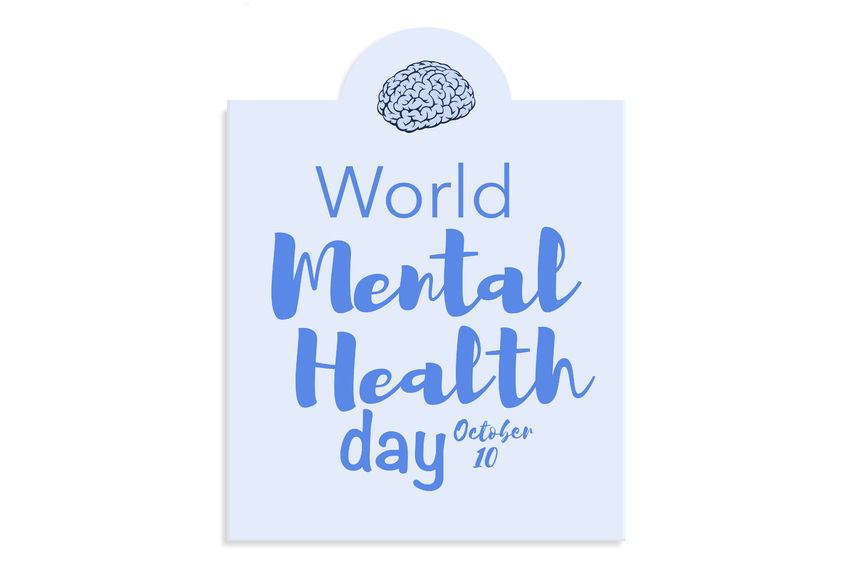A Change of Routine
Wednesday October 10, 2018 was World Mental Health Day.
HINT: this post is going to be about mental health.
We all have routines. Some more rigid than others. I learned the beauty of routine and organization from my family. Daily routines for families are a chaotic orchestra of rides, school, extracurricular activities, conflicts, meals, work and play. Routine is something that makes me feel balanced, even and in control. It appeases my OCD brain.
I was never treated with medication for my OCD. As I moved through life and education I learned how to appease that part of my brain on my own. My brain and I came to an agreement about how to maintain balance.
Remember the Law of Conservation of Energy? It states that energy is neither created nor destroyed, only transformed from one form to another. This is a physics law, but we are physical beings and this law can apply to our bodies. What happens to the energy within our bodies when we are nervous? Anxious? Excited? Happy? Scared? Stressed? Well, our heart rate (HR) changes, our breathing rate changes, our muscle tone changes and the pH of our blood can change. Remember homeostasis??? It is happening all the time in our body and our nervous system plays a huge role. The Autonomic Nervous System (ANS) is made up of the sympathetic (Fight or Fight) and parasympathetic (Rest and Restore) nervous systems. An increase in: HR, breathing rate, muscle tension and level of alertness are all normal symptoms of someone in a sympathetic (Flight or Fight) state. The body is revved up for action, ready to survive. BUT! No one is going to die if I lose a soccer game, fail a test or bomb a piano recital. So why does my body react to these scenarios the same way as if I were being chased by a wolf? Pre-game/performance anxiety is the body experiencing the physical symptoms of a perceivedstressful situation. Again, the brain is in control. Homeostasis has a chance to level things out once we leave a sympathetic state and enter a parasympathetic state. No organism can sustain being in a sympathetic state for too long. Over activation of the sympathetic nervous system results in the decline of how our body functions. We quite literally need balance between the parasympathetic and sympathetic nervous systems. Traditional Chinese Medicine (TCM) acupuncture is based on the idea of Yin and Yang and restoring balance to the body’s flow of energy or Qi (pronounced ch-ee). Acupuncture points are explained in Western medicine as an attempt to restore balance within the ANS. For most of my life I found balance through sports, exercise and movement. I would buckle down and study for hours with intense focus, then exercise. Periods of perceived stress alternating with periods of energy output and relaxation. Balance.
There’s that balance thing again…It must be important. As far as I know, there are no successful brain transplant surgeries taking place. My brain is the only one I have ever known and my diagnosis of OCD gave it a quick way of explaining my physical symptoms and perceptions related to feeling out of balance or “off”. As I grew, I adapted through different experiences of the world’s energy. After my back surgery in 2012 life did not slow down, it sped up. I loved it. My body felt great, my brain was happy and I was fulfilling my dream of becoming a physiotherapist. With my Masters completed, and job offers waiting, I dove straight into the working world as a medical professional.
I had to experience post-school life to believe that being a working adult is very, very hard. I thought school was tough, but school offered me the reassurance of a steady routine. After my education was complete, everyday life had a way of being simultaneously exciting and really stressful. I no longer had a balanced routine of stress and relaxation. The chaos of life never seemed to end. My normal became something I was not used to and all my strategies to manage myself were coming up a bit short.
Life went on.
Over my first years of being a physiotherapist I worked in different settings from hospital to private clinics. I felt restless though. I did not really understand what was wrong with me. There was this omnipresent, low at first, but increasing feeling that something was off. I did not have a specific direction career wise, and I was overwhelmed by being a physiotherapist. My body always felt tired, I was easily distracted and my “normal OCD vibration feeling” was stronger than normal and more frequent. I was stuck in a sympathetic (Fight or Flight) state; and I started to feel angry, beaten down and on the verge of a quarter life crisis! But why? Everything I had focused my energy on, my whole life, was completed. I played collegiate level soccer, I finished my Masters by age 25, and I married my absolutely beautiful, too good for me, wife (she is my rock). Yet…there was this grey, heavy feeling that made everyday tasks seem like the hardest obstacles. It could have been the Vancouver winters, or not.One thing was certain, my body could not run faster than my mind. I decided to talk to my doctor. Well actually, my wife and family had to give me the best gentle (strong) push. I had a pretty good idea what the doctor was going to say because I am a nerd and analyze everything. Why do I need someone else to tell me what I already know? Safe to say I was resistant. Eventually, I sought help, and that led me to an official mental health diagnosis. I was suffering from anxiety and depression (YA THINK?!?!) and medication can help with that. I had felt like this to some degree before, but why so intense and for so long? And what can I do besides medication? Thus began my ongoing battle with my brain. Wait! What? Why am I battling my brain?
Time for a David’s Brain Moment.
I am the hero of my story. In Religious texts, famed literature and cinematic experiences there is always a hero/heroine you can identify with. A person who exudes the ideals we hold dear. Is it just me, or did our current healthcare system point me to question my own brain? The way I think has been the only way I have survived. How can my brain be sick or deficient? What changed? Can this be tested?
The wheels of medicine turned and I, under the guidance of my brilliant pharmacist sister, and my doctor, started to take a selective serotonin re-uptake inhibitor (SSRI). SSRIs are a class of drug that keep the levels of serotonin in our bodies up by blocking its removal from our nerve synapses. Whoa, science! Here is the kicker. There is no way to test the serotonin levels in your brain! We do not even know how much of the drug successfully crosses the blood brain barrier. That’s right. Our brain is so important it has extra security for blood! So we are essentially medicating with no baseline. Obviously it is more complicated than that, but my summary is accurate. I support drug research because the use of medication can be an integral part of healthcare. Okay, back to me. How will I know when the medication works? Well, you will feel better, it may take time, and you may need to increase the dosage… I hated hearing that. I did not want to need any medication. I did not want to be seen as mentally ill!
The other major medical intervention for mental health is psychiatry/psychology. Only difference between them is the former can prescribe drugs the latter can not. I saw a psychiatrist who agreed with the my SSRI medication for an Anxiety/Depression diagnosis, and recommended continued appointments with a psychologist. My psychologist in Vancouver was very, very, very helpful to my wife and I. So is my psychologist here in Calgary. Until now, I really disliked talking about this stuff with anyone outside of my very, very inner circle; even though I had no troubles talking about my OCDness, my surgeries, or my injuries. People close to me know I am an anxious/stressed out guy at times. Who isn’t? But having to seek help, being diagnosed and treated, made me feel ashamed. I felt guilt. This is something I want to address. Anyone who is struggling with their mental health should not feel guilty or ashamed to seek help. Period.
When thinking back to the subjective explanation of pain (remember our definition from post #2) it makes sense to treat anxiety/depression with a drug that has been shown, through good research, to balance out mood and improve symptomsof anxiety/depression. There are side effects, and anyone seeking help with their mental health should consult their physician before using any medication.
There is that word again, symptoms. We defined that term as well in post #2. Whoa! It’s like someone is actually captaining this ship. Our symptoms are our brains and bodies telling the world what they need (think of that screaming baby). Here is a list of things that can improve the symptoms of Anxiety/Stress/Low Mood/Depression/Pain:
- Exercise!!!!!
- Talking to a psychologist or counsellor
- Pharmaceuticals (ex. SSRIs)
- Diet/Nutrition
- Cannabis…
Time for a well placed announcement
On October 17th Canada became the second country in the world to legalize cannabis. It is a very interesting time for Canadian healthcare because brains are tricky. They take up to 26 years to fully develop. This is why there has been such a great national debate about the legal age for cannabis use. Its use has been shown to increase the likelihood of a psychotic break, in those who are genetically susceptible, if used chronically while the brain is still developing. There is a growing body of research supporting the use of cannabis for children with epilepsy, cancer patients, and sufferers of chronic pain. Its the brain where we do not fully understand the long term impact of cannabis use. That is why, though pro-cannabis, I recommend every Canadian talk to there medical team before starting to use cannabis or cannabis products. I am pro-mental healthbefore pro-cannabis.
Back to me.
The SSRI medication helped me through a particularly grim time and, under the guidance of my doctor, I kept taking a small dosage. I continued struggling to feel balanced or back on even ground. My brain was busy trying to be a good physiotherapist and search for reasons why I felt the way I felt, all the time. It was, and is, an ongoing discussion in my brain. The most helpful thing for my mental health was STARTING the CONVERSATION and finding a psychologist I was comfortable with.
I hope this post continues to facilitate the breaking down of barriers we face today in mental health education and treatment. For more information on mental health, please check out this URL for the Canadian Mental Health Association: www.cmha.ca
For more information on cannabis follow this URL to a Government of Canada website
https://www.canada.ca/en/services/health/campaigns/cannabis/canadians.html
If you are scratching your head wondering when I will continue about my back. Relax! Have a toke (cannabis humour). Scroll on down to the next post.

